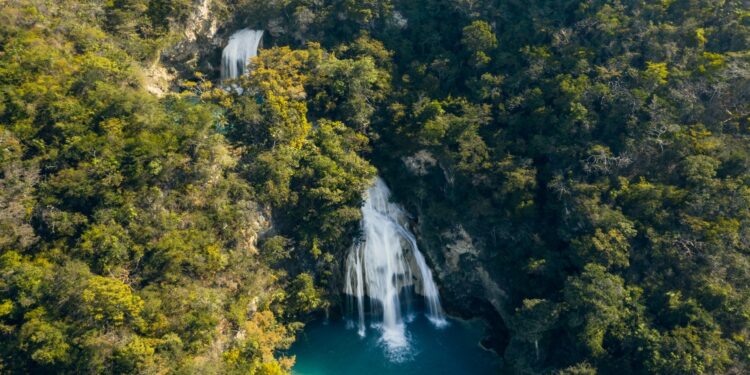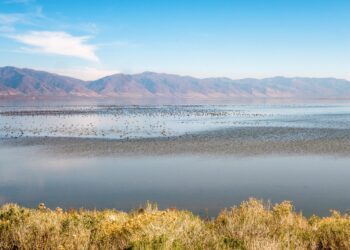Nature can play a fundamental role in achieving net-zero, with the capacity to deliver one third of cost-effective solutions to climate change, yet delivering a sustainable net-zero future for land use will require a coordinated transformation.
The world faces converging environmental crises that are inextricably linked: the accelerating destruction of nature and climate change, driven largely by unsustainable production and consumption. Science warns us that if we deviate from the Paris Agreement target to limit global warming to 1.5°C, the world could quickly find itself at a tipping point.
Nature underpins our global economy, generating approximately $44 trillion of global economic value. Nature will also play a fundamental role in achieving net-zero, with the capacity to deliver one third of cost-effective solutions to climate change.
Meanwhile, croplands account for 38% of the global land surface, and agricultural practices are a significant driver of tropical deforestation. Coupled with forestry and other land-use activities, these account for 24% of total global emissions, mainly from deforestation and agricultural emissions from livestock, soil and nutrient management. Agriculture alone is the largest driver of land use change and deforestation in the tropics accounting for >90% of the estimated forest loss in the last two decades.
We know that between 1990 and 2016, the world lost 130 million hectares of forest. Agricultural commodities such as cattle, palm oil, soy, cocoa, rubber, coffee and plantation wood fibre, accounted for 26% of global tree cover loss from 2001 to 2015, replacing 71.9 million hectares of forest, an area twice the size of Germany. The 2019 UN Intergovernmental Panel on Climate Change Land Use Report concluded that protecting and restoring forests and urgently revamping the global food system through dietary change are key solutions to the escalating biodiversity, climate, and food security crises.
Agriculture, forestry and land-use is a unique sector as it provides food that feeds the Earths’ population of around 7.6 billion, livelihoods for billions of people worldwide, and is a critical resource for sustainable development in many regions. Land-use is then both a source and sink of CO2 emissions, playing a crucial role in combating climate change.
The race to zero
Delivering a sustainable net-zero future for land use will be challenging and will require a coordinated transformation. Policymakers, businesses, investors, innovators, and citizens must all come together to trigger this transformation and agree on the next steps. With the United Nations Climate Change Conference (COP26) in Glasgow the vital milestone later this year, the promises and pledges made by governments must be converted into meaningful action, starting today.
The calls for change have also been accompanied by the arrival of initiatives that can accelerate change in the land-use sector. One example is the FACT (Forest, Agriculture and Commodity Trade) Dialogue launched by the COP26 Presidency and supported by Tropical Forest Alliance (TFA) to accelerate the transition towards more sustainable land-use practices in a way that opens up new opportunities for investment and jobs.
But even with change underway, the world must quickly achieve breakthroughs in every sector of the global economy. Race to Zero is a global campaign to rally leadership and support from businesses, cities, regions and investors for a healthy, resilient, zero-carbon recovery that prevents future threats, creates decent jobs and unlocks inclusive, sustainable growth. To win the race to net-zero emissions by 2050 (at the very latest) means we must collectively halve current emissions by 2030, and then again by 2050. There is no time to waste.
Going one step further, the Race to Zero Breakthroughs offer a set of roadmaps to achieving the Paris Agreement targets of 1.5°C across all sectors. For Nature-Based Solutions (NbS) and the land-use sector, the ambition is to have 20% of the food supply industry adopt a science-based target aligned with the Paris Agreement by no later than COP26, commit to deforestation-free supply-chains by 2023, adopt a science-based net-zero target to reverse biodiversity loss and enhance regenerative agriculture by 2023.
What can companies do?
Although the net-zero finish line feels far off in the distance, the good news is that we can get there, and do so in a way that is good for business and promises a resilient future that vastly justifies taking action. Exponential Roadmap research is consistent with this, indicating that nature can help us to reduce and remove as much as 98GT CO2e from the atmosphere by as early as 2030. The World Economic Forum’s Nature and Net Zero report, meanwhile, estimates that natural climate solutions, including cover crops, can deliver up to 7Gt CO2 per year and at a lower cost than other forms of CO2 removal. In most cases, prices are between $10-40 per tonne of CO2 with variations between geographies and project types.
The world can feel encouraged even in the face of COVID-19; during the pandemic, net-zero commitments have roughly doubled. Corporate commitments alone under the Race to Zero campaign now cover over 12% of the global economy and USD$ 9.81 trillion in revenue. We also know that a 55% decarbonization of the global food supply chain is viable through nature.
To join the movement for a net-zero, nature-positive economy, companies are expected to integrate the full value of ecosystem services from forests and other natural landscapes into all business decisions by 2025. In addition, businesses can also deliver on commitments to end losses to primary forests and to other natural ecosystems such as mangroves, peatlands, grasslands and savannas, so that by 2030 nature’s loss has been reversed.
But breakthroughs cannot happen if we all work in isolation. The challenges of competition and inertia often lower our ambitions. There needs to be a shift towards nature-positive, net-zero land use, which will require ongoing financial support and investment in NbS.
Financing the nature-positive race to zero
Facilitating this move towards net-zero land use will need ongoing financial support and require a shift in negative financial flows. The newly-published State of Finance for Nature report states that approximately US$133 billion a year currently flows into nature, with public funds making up 86% and private finance 14%. The report also says that investment in NbS ought to at least triple in real terms by 2030 and increase four-fold by 2050 if the world is to meet its climate change, biodiversity and land degradation targets.
However, current investments and capital flows can have a negative impact on nature. Countries that produce two-thirds of the world’s agricultural output provided US$600 billion per year in agricultural financial support on average from 2014 to 2016. Only 5% of this funding supports any kind of conservation or climate objective, and only 6% supports research and technical assistance. Governments should create economic and regulatory incentives to scale up nature-positive investments.
Given its critical role in both mitigation and adaptation, it is fundamental that financial institutions commit to become ‘nature-positive’ by 2030, including reversing biodiversity loss associated with investment and lending portfolios. Financial institutions should design and deliver innovative financial products that promote climate-smart, agro-ecological practices, and work with governments and funders to design appropriate financial mechanisms to the same end, with the aim of halving emissions and reversing nature loss by 2030.
Financial alliances like the Glasgow Financial Alliance for Net Zero, which brings together leading net-zero initiatives from across the financial system to accelerate the transition to net-zero emissions by 2050 at the latest, and the Net Zero Asset Managers Initiative, will be instrumental in delivering on these financial and business opportunities. This coordination among financial institutions should promise that 20% of major asset owners, asset managers, and banks commit to land-conversion free investment portfolios by 2025.
With five months to go until COP26, and as we enter the UN Decade for Ecosystem Restoration, we have arrived at a critical moment to avoid a climate and ecological breakdown. Together the world must race towards a resilient, healthy and zero carbon world. Rather than reaching a tipping point, 2050 could be a world where decarbonized industries are coupled with fertile forests and restored land.
The nature-positive race is on.
By Justin Adams & Gonzalo Muñoz












